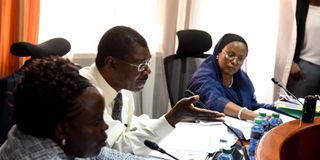Strengthen House committees

Members of the Senate ad hoc committee investigating the MES project. It was chaired by Isiolo Senator Fatuma Dulo (right).
What you need to know:
- Nowadays, proceedings of these committees are a very transparent and formal affair.
- What is beginning to emerge, however, is that capacity to investigate complex transactions is becoming a big problem for these committees.
- There is also a good case for giving committee members access to modern library and research facilities.
The credibility and public trust in our parliamentary oversight systems have, yet again, been dealt a brutal blow. I refer to the voting out last week by the Senate of a report by its select committee on the multibillion-shilling Managed Equipment Services (MES) programme.
The dramatic development was an anti-climax; the special committee had promised a blockbuster of a report, which it touted as a gripping tale on the workings of a criminal enterprise within the government and their private sector allies. But, it turned out, the report will not see the light of day, having been voted out by the House.
The episode left tongues wagging with claims and counter-claims about the capture of Parliament by money changers and how vultures had been circling the House to foment a rejection of the report.
The manner and style of the rejection itself was full of drama. The Sunday Nation reported that, as the report was being prepared for debate and a vote on Tuesday, there were 38 senators in the chamber. But as debate progressed into the evening, only 29 members remained in the House to participate in the vote, the rest having left.
And out of the 29, a whole lot of 27 voted against the report. The two who supported the adoption of the report were the committee’s chair, Deputy Majority Leader and Isiolo Senator Fatuma Dullo, and committee member Enock Wambua (Kitui).
What a waste of public resources! Isn’t it the height of irony that even members of that committee did not stay to vote for adoption of their own report?
Is Parliament’s oversight framework really serving us well? This is a pertinent question because, until recently, the impression has all along been that our parliamentary committee oversight systems have been doing quite well.
Special committees have powers to subpoena documents and witnesses even from the private sector. They conduct public hearings in the full glare of the media.
Nowadays, proceedings of these committees are a very transparent and formal affair. Penalties for contempt and perjury are observed. They have adequate administrative and research support.
What is beginning to emerge, however, is that capacity to investigate complex transactions is becoming a big problem for these committees. It would appear as if collecting evidence carefully, weighing the issues and arriving at well-written decisions and determining culpability of individuals continue to remain a big challenge.
Long letter
Senior Counsel Paul Muite, who represented the legal firm Iseme , Kamau and Maema Advocates during the hearings, has written a long letter complaining that the committee ignored all documents that he presented at face value and proceeded to make recommendations as if the documented evidence did not exist.
Whether Mr Muite’s lamentations are valid or not is a matter that cannot be settled in these pages. However, the more I read his letter, the more I am persuaded that there is a good case for strengthening these special audit committees of Parliament by injecting into them people with skills on how to deftly take and record evidence from witnesses, auditing, forensic auditing and investment banking.
There is also a good case for giving committee members access to modern library and research facilities.
I’m not saying that a special committee of Parliament should not be allowed the leeway to exercise its own discretion on matters placed before it for investigations. My point is, we will need to have in-built checks and balances to ensure the recommendations of these special committees sound less arbitrary.
Secondly, while the case for a strong and independent system of parliamentary oversight committees cannot be gainsaid, it seems that the framework will need to be fine-tuned to include checks on the possibility of the outfits being used for political ends.
Is this the end of the investigations into the alleged malpractices involving the MES programme? I don’t think so. Any other investigating agency can take up the matter and investigate it afresh.
We almost have anti-corruption agencies flowing out of our ears. They include the Auditor-General, Office of the Ombudsman, the Ethics and Anti-Corruption Commission, Multi-Agency Task Force, Directorate of Public Prosecutions and the Directorate of Criminal Investigations.
Others are the Internal Auditor-General Department of the National Treasury, Assets Recovery Agency and multiple parliamentary committees of the National Assembly.
The risk of wastefulness, duplication and contradictory policies is high, indeed. What we must do is increase the independence of these agencies from one another even as we encourage competition between them.





